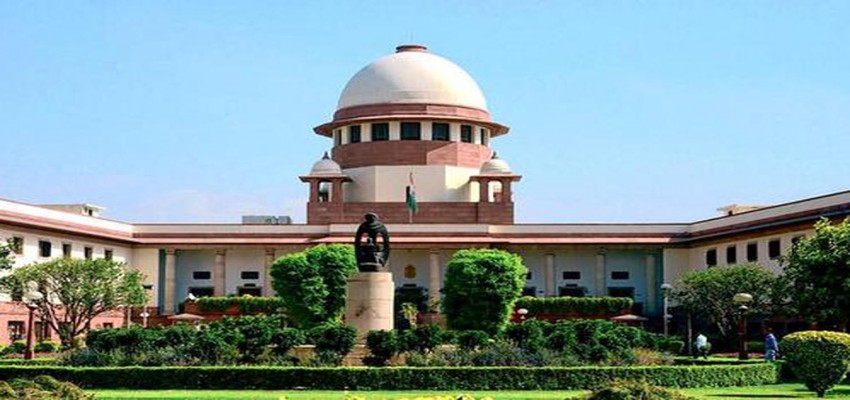
Centre wants Constitution bench to lay down powers of Delhi govt
A five-judge bench, headed by Chief Justice of India (CJI) Dhananjaya Y Chandrachud, is expected to take up on January 10 the cases pertaining to the power tussle between the Centre and Delhi government over administration of the capital.
The administration of the national capital requires coordination and not threat of control over officers, the Union government submitted in the Supreme Court on Monday, as it accused Delhi deputy chief minister Manish Sisodia of “falsehood” regarding lack of cooperation from bureaucrats. The Centre demanded a constitution bench of at least nine judges to outline afresh the powers of the elected government in Delhi.
A five-judge bench, headed by Chief Justice of India (CJI) Dhananjaya Y Chandrachud, is expected to take up on January 10 the cases pertaining to the power tussle between the Centre and Delhi government over administration of the capital.
Filing two separate documents in the top court on Monday, the Centre asserted its “legislative supremacy” and “overall executive control” over Delhi, and pleaded for effectively a reconsideration of a five-judge bench decision in 2018 that restricted the executive power of the Union government in respect of NCT of Delhi to three subjects -- land, police and public order.
The 2018 judgment, the Centre’s application contended, erroneously created a new class of territory through a “judicial fiction” by elevating Delhi to the status of a state by giving its elected government an “executive supremacy” even though the Parliament “undeniably enjoys legislative supremacy”.
Arguing that the 2018 judgment is inconsistent with the nine-judge bench ruling in NDMC VS State of Punjab (1996), in which the top court ruled that Delhi stands on no different footing from any other Union Territory in so far as its legislative powers are concerned, the Centre said that only a bench of nine or more number of judges can now resolve the legal conundrum.
Apart from moving the application that sought a reference to the larger bench on the argument that Delhi must remain a Union territory “under the legislative control and supremacy of the Parliament”, the Centre, through Union home secretary Ajay Bhalla, also filed its reply to an affidavit filed by Sisodia last month, complaining that civil servants treat the elected government with an alarming degree of laxity and contempt.
“I am advised not to deal with individual illustrations which would have clearly shown the falsehood contained therein since the deponent of the affidavit is the hon’ble deputy chief minister and it may not be proper, appropriate or in good taste to deal with such assertions, more particularly, when I have found them to be not true,” stated Bhalla’s affidavit.
The home secretary also emphasised that Delhi is a UT and no UT under the Constitution has its own services which are not controlled by the central government because that is the constitutional scheme.
“The administration of any unit of the administration, be it central government, state government or Union territory requires a very skilful coordination between the political executives and persons working in connection with the affairs of the respective unit. Such coordination takes place by effective administrative skills and not with the threat of control over the officers or employees,” Bhalla’s affidavit stated.
On Monday morning, solicitor general Tushar Mehta informed the CJI about the Centre’s fresh plea for referring the legal wrangle between the two governments over the control of bureaucrats to a bench consisting of at least nine judges.
In view of the important legal and constitutional issues being raised through the new application, Mehta said the matter requires to be referred to a larger bench of nine or more judges. He requested the CJI to permit the Centre bring its plea on record. “There are no facts to be controverted. This is only on the point of law. I have filed an IA (interlocutory application) stating that this matter may have to be referred to a larger bench”.
The Delhi government, represented by senior advocate Abhishek Manu Singhvi, opposed the Centre’s plea, saying: “This will only create delay and such tactics cannot be allowed.” The same plea by the Union government was rejected by a three-judge bench in May, when the matter was referred to the bench of five judges, Singhvi added.
At this, CJI Chandrachud told Mehta that the plea could be considered when the five-judge bench starts hearing the case. “What action has to be taken on the IA can be decided when the constitution bench assembles to hear it,” he said.
The constitution bench is currently seized of two connected cases. The first relates to the tug of war between the Union and Delhi governments over the control of bureaucrats, while the second matter pertains to the 2021 Government of National Capital Territory of Delhi (Amendment) Act, which gives an upper hand to the lieutenant governor in the matters of administration of Delhi.
The 2021 amendment makes it mandatory for the Delhi government to seek the opinion of the lieutenant governor before taking any executive action in pursuance of decisions by the council of ministers, or any other decision under any law in force in the capital, a clause which the Aam Aadmi Party (AAP) government has averred to be contrary to previous Supreme Court judgments and constitutional provisions favouring an elected government in Delhi.
In May, a three-judge bench had referred the matter to a constitution bench, clarifying that the larger bench shall adjudicate the limited issue relating to services in Delhi and that no other substantial issue on the interpretation of Article 239AA requires to be touched since previous orders cover other issues.
Article 239AA delineates the legislative and executive powers of the Delhi government while clarifying three subjects, namely land, police and public order, shall remain under the exclusive domain of the Centre in the capital.
Before the three-judge bench, the Centre had pressed for a fresh adjudication by a constitution bench to set the boundaries of the AAP government in Delhi in so far as it relates to transfer and appoint bureaucrats in the capital.
According to the Centre’s submissions, there can be more than the three subjects specifically mentioned under sub-section 3 of Article 239AA (land, police and public order) on which the Delhi government is restricted from passing a law, and that this aspect should be clarified by another constitution bench after taking into account the nine-judge ruling in the NDMC Vs State of Punjab Case.
The Delhi government, on its part, had at that time opposed the Centre’s views, seeking a quick decision on whether or not it has the executive power to transfer and appoint bureaucrats in the Capital.
In a previous round, the five-judge bench in July 2018 held that the executive power of the Union government in respect of NCT of Delhi is confined to land, police and public order under subsection 3 of Article 239AA.
After the pronouncement of the legal position, the constitution bench sent the matter to a two-judge bench to decide individual issues of contention. In this second round, the bench resolved all issues but the judges delivered split ruling on the legislative competence of the Delhi government in relation to “services” as contained in Entry 41 of List II of the Seventh Schedule of the Constitution. Subsequently, it was referred to a three-judge bench and then to a five-judge bench.
Courtesy: Hindustan Times

